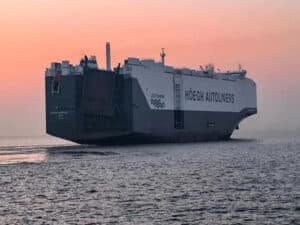
Cargill in wind propulsion initiative
Written by Nick Blenkey
Project aims to fit large, solid wing sails that measure up to 45 meters in height on the deck of bulk cargo ships. [Image: Cargill/BAR Technologies]
Agribusiness giant Cargill, one of the world’s top charterers of ships, is continuing to put its considerable weight behind efforts to decarbonize shipping. In its latest move in this direction it has partnered with BAR Technologies of the U.K. and Finnish naval architect firm Deltamarin to bring cutting edge wind propulsion technology derived from America’s Cup yacht racing to commercial shipping.
The project will see BAR Technoloies’ WindWings—large, solid wing sails that measure up to 45 meters in height—fitted to the deck of bulk cargo ships to harness the power of the wind and reduce CO2 emissions by as much as 30%. The number of wing sails can be tailored to the size of the vessel and the route it will take.
BAR Technologies is a spin-off from Ben Ainslie Racing (BAR), the British team formed by Olympic and World Champion sailor Sir Ben Ainslie.
“Through this partnership we will bring bespoke wind solutions to customers who are actively seeking to reduce CO2 emissions from their supply chain,” said Jan Dieleman, president of Cargill’s Ocean Transportation business. “Changing regulations and uncertainty about future greener marine fuels makes choosing the right vessel to charter with a long-term view complicated. With the WindWings technology, Cargill will be able to offer customers a solution that improves vessel efficiency, independent of the fuel or type of engine used,” he continues.
“Wind is a near marginal cost-free fuel and the opportunity for reducing emissions, alongside significant efficiency gains in vessel operating costs, is substantial. We’ve invested in our unique wind sail technology to provide vessel owners and operators with an opportunity to realize these efficiencies,” said John Cooper, CEO, BAR Technologies.
The maritime industry faces a huge challenge to reduce average CO2 emissions by 40% by 2030 and working towards 70% by 2050, compared with 2008 levels. Cargill as one of the industry’s largest players, chartering a fleet of more than 600 vessels at one time, says that it recognizes its responsibility to accelerate decarbonization progress, and has brought the necessary vision and scale to convert BAR Technology’s inspiration into measurable efficiency savings.
The project is currently in the design phase, bringing together a team of companies to deliver the first vessels—expected on the water by 2022. The team will share risk and expertise, starting with product tankers before moving to dry bulk vessels.
Deltamarin has a specific focus on optimizing the hull form and appendages as well as propulsion and steering configuration for WindWings vessels.
“Deltamarin was selected as the naval architect for this project due to its track record in designing efficient cargo vessels and introducing new technologies to ships,” says Keith Dawe, Sustainability Projects and Investments Leader of Cargill Ocean Transportation.
Cargill has partnered with a number of industry leaders and organizations to drive decarbonization progress, including the Global Maritime Forum and its Getting To Zero Coalition, the Sea Cargo Charter, a recent initiative to cut and track emissions from chartered ships to reduce the maritime industry’s carbon footprint and the Maersk McKinney Moller Center for Zero Carbon Shipping. Last year, Cargill announced a collaboration with Maersk Tankers and Mitsui & Co. to provide over-the-shelf solutions for maritime actors looking to explore new technologies to reduce their emissions.




